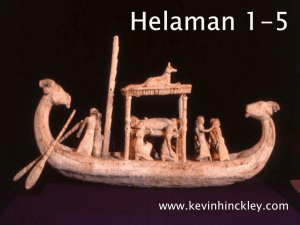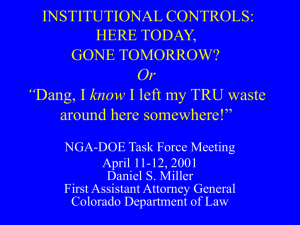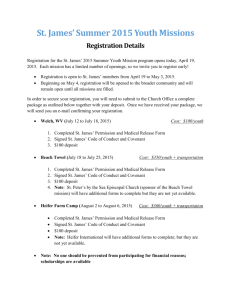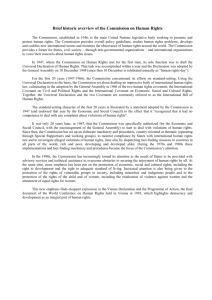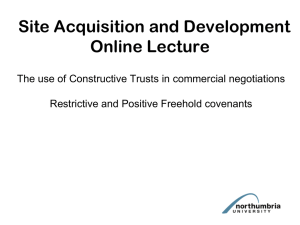Fear Not!
advertisement
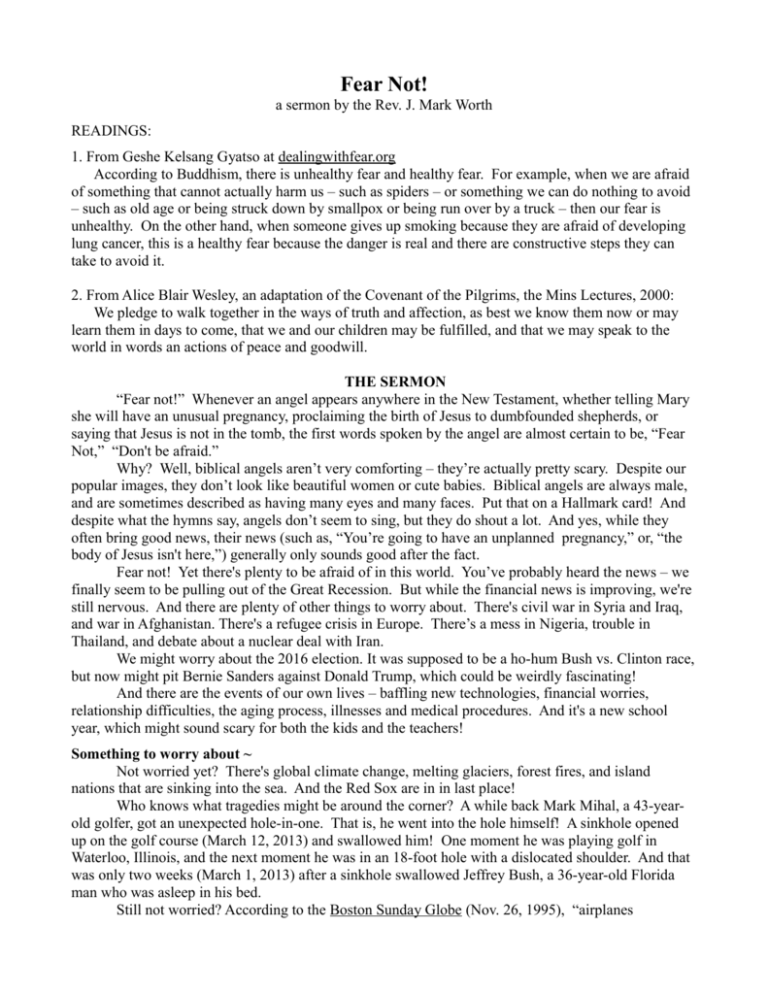
Fear Not! a sermon by the Rev. J. Mark Worth READINGS: 1. From Geshe Kelsang Gyatso at dealingwithfear.org According to Buddhism, there is unhealthy fear and healthy fear. For example, when we are afraid of something that cannot actually harm us – such as spiders – or something we can do nothing to avoid – such as old age or being struck down by smallpox or being run over by a truck – then our fear is unhealthy. On the other hand, when someone gives up smoking because they are afraid of developing lung cancer, this is a healthy fear because the danger is real and there are constructive steps they can take to avoid it. 2. From Alice Blair Wesley, an adaptation of the Covenant of the Pilgrims, the Mins Lectures, 2000: We pledge to walk together in the ways of truth and affection, as best we know them now or may learn them in days to come, that we and our children may be fulfilled, and that we may speak to the world in words an actions of peace and goodwill. THE SERMON “Fear not!” Whenever an angel appears anywhere in the New Testament, whether telling Mary she will have an unusual pregnancy, proclaiming the birth of Jesus to dumbfounded shepherds, or saying that Jesus is not in the tomb, the first words spoken by the angel are almost certain to be, “Fear Not,” “Don't be afraid.” Why? Well, biblical angels aren’t very comforting – they’re actually pretty scary. Despite our popular images, they don’t look like beautiful women or cute babies. Biblical angels are always male, and are sometimes described as having many eyes and many faces. Put that on a Hallmark card! And despite what the hymns say, angels don’t seem to sing, but they do shout a lot. And yes, while they often bring good news, their news (such as, “You’re going to have an unplanned pregnancy,” or, “the body of Jesus isn't here,”) generally only sounds good after the fact. Fear not! Yet there's plenty to be afraid of in this world. You’ve probably heard the news – we finally seem to be pulling out of the Great Recession. But while the financial news is improving, we're still nervous. And there are plenty of other things to worry about. There's civil war in Syria and Iraq, and war in Afghanistan. There's a refugee crisis in Europe. There’s a mess in Nigeria, trouble in Thailand, and debate about a nuclear deal with Iran. We might worry about the 2016 election. It was supposed to be a ho-hum Bush vs. Clinton race, but now might pit Bernie Sanders against Donald Trump, which could be weirdly fascinating! And there are the events of our own lives – baffling new technologies, financial worries, relationship difficulties, the aging process, illnesses and medical procedures. And it's a new school year, which might sound scary for both the kids and the teachers! Something to worry about ~ Not worried yet? There's global climate change, melting glaciers, forest fires, and island nations that are sinking into the sea. And the Red Sox are in in last place! Who knows what tragedies might be around the corner? A while back Mark Mihal, a 43-yearold golfer, got an unexpected hole-in-one. That is, he went into the hole himself! A sinkhole opened up on the golf course (March 12, 2013) and swallowed him! One moment he was playing golf in Waterloo, Illinois, and the next moment he was in an 18-foot hole with a dislocated shoulder. And that was only two weeks (March 1, 2013) after a sinkhole swallowed Jeffrey Bush, a 36-year-old Florida man who was asleep in his bed. Still not worried? According to the Boston Sunday Globe (Nov. 26, 1995), “airplanes periodically shed objects such as aluminum skins, access panels, fuselage doors, hot turbine blades, frozen sewage, cowlings, engine cones and even whole engines.” Imagine getting hit with frozen airplane sewage that has been hurtling toward earth at hundreds of miles per hour! Even worse, the New York Times has reported (Oct. 22, 1997) that our galaxy, the Milky Way, is moving toward the Andromeda galaxy at the speed of 300,000 miles per hour. It is quite possible that the two galaxies will collide head-on with one another in only five billion years! Unhealthy and healthy fears ~ And yet our better angels say, “Fear not.” Don't be afraid. Let go of your fear. Buddhism teaches that there are healthy fears and unhealthy fears. If we fear a collision with another galaxy, this is an unhealthy fear because it's billions of years from now, and we can’t do anything about it anyway. But if we fear a bad habit like smoking, this is a healthy fear because it can help us to avoid lung cancer, heart disease and emphysema. On the other hand, we all age. We can't avoid change. Or as my wife, Mickey, puts it, “Everyone who eats pickles dies.” Yes, that's very Buddhist of her! She accepts impermanence. Because whether we eat pickles or not, no one lives forever. After the Buddha realized that suffering is an unavoidable part of life, he knew that the way to end suffering was to find out what caused it. Just as a doctor needs to diagnose an illness in order to treat it, we need to know what causes our fears and anxieties if we are to overcome them. Why do we suffer? Why are we anxious? Why are we afraid? By observing people, the Buddha discovered that the causes of suffering are craving and desire. What do we desire? Favorite foods, entertainment, new gadgets, popularity, money, to stay young forever – so many things! Whatever we have, we want more. And so Buddhism says we should recognize what this is all about, and let go of our desires and cravings. In our lives we watch everything change – children grow up, we grow old, our friends grow old, we will lose everything we have known. This is not pessimism; it’s realism. When we acknowledge and accept that everything in our world is temporary, that everything changes, we are less fearful. And when we let go of the fear of change, we can be happier people. Challenges in Harvard ~ Things are changing at our church. That's normal. This is a time of transition. In fact, every single moment is a transition from the previous moment to the next one. Yes, I'm an interim minister. We know that my time here is limited, just two years. But really, no matter what we are doing now, we are all interims. Nobody lives forever, and nobody stays forever. We've had some changes here at HUUC. But fear not! You accomplished a lot in the fourteen years of Rev. Wendy's ministry. You became a Welcoming Congregation. The Glean Team and Loaves and Fishes participation helped focus on social justice. You re-designed and built a beautiful new Fellowship Building. You have a great music program. I could go on. You've done a lot. Now, you've faced the departure of the settled Minister and the Director of Faith Formation this past Spring. But fear not! There are good, thoughtful people serving on the Faith Formation Team, talented teachers, dedicated volunteers, and you have an engaged Church Board. I will be giving my support to the program. And there are wise and helpful people at the Unitarian Universalist Association, the UUA, who can give important advice and guidance. And so, as I said in the Belfry, there's good news and there's good news. The good news is that if you like me, I'll be here for the next two years. And the other good news is, if you don't like me, I'll be gone in two years. I come to you pre-fired! Over the next two years I will be your minister, I'll lead worship, teach adult education, do pastoral care, attend committee meetings, and everything else a pastor or minister does. The Board and the Search Committee will communicate what is going on in the search process to the greatest extent possible. So fear not. We will work and play together. We will look after one another. We will do what needs to be done, and I'm confident we will have fun doing it. And I will fall in love with you. And when the time comes to say goodbye, I will say goodbye. Our covenant ~ Our task together over the next two years is both challenging and simple. Our goal is to be nice to each other while we go through some change. And that means we're going to have to be a little flexible. Like Silly Putty, we may have to bend, flow, float, or bounce! As Unitarian Universalists, we have built-in flexibility. Rev. Alice Blair Wesley points out that we are different from most churches because we're not a creedal church. Most churches expect everyone to agree about doctrines. They want everyone to agree about God and Jesus and heaven and hell. We don't. We are a covenantal church. Covenants aren't about doctrines; covenants are about how we will treat one another while on our spiritual journeys. We speak our covenant every week, and we said it today: “Love is the spirit of this church, and service is its prayer. And this is our great covenant, to dwell together in peace, to seek truth in freedom, to speak the truth in love, and to help one another.” Our covenantal roots are found in the covenants of our Pilgrim fathers and mothers. The Pilgrims and Puritans had radical ideas about church. They thought the congregation, not a bishop or pope or king, should be in charge of its own affairs. We call it congregational polity or congregational governance. And yes, like our Pilgrim ancestors, we are congregational with a small c. And, also like the Pilgrims, we are covenantal. Covenants give us flexibility. We are the Silly Putty church! Covenants give us bounce. Maybe you're Buddhist but the person next to you isn't. Or you believe in God but the person sitting next to you doesn't. That's okay. We have flexibility, we can bounce back from differences, because we have a covenant about how we will treat one another, not a creed that expects us to always agree. So, fear not! Alice Blair Wesley suggests that her favorite covenant, based on the covenant of the Pilgrims, says, “We pledge to walk together in the ways of truth and affection, as best we know them now or may learn them in days to come, that we and our children may be fulfilled, and that we may speak to the world in words an actions of peace and goodwill.” That's our task. And if we can do that, then we'll be fine. Then we can truly fear not. …..Amen.

